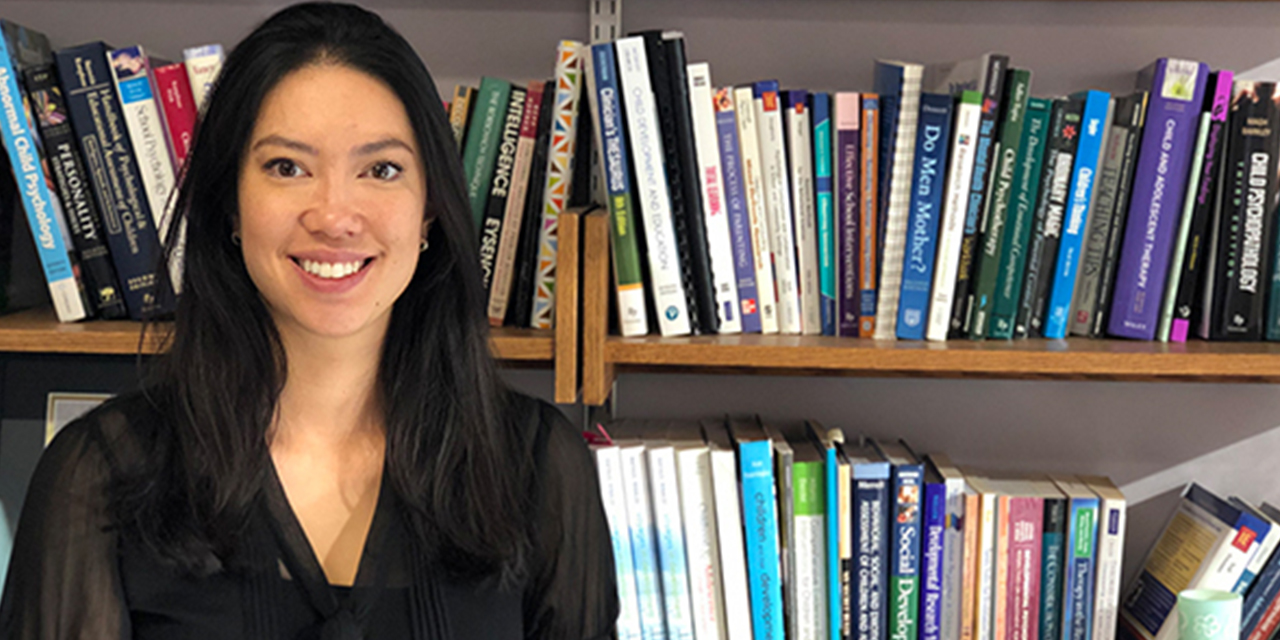
Chelsea Durber, 2019 Dorothy J. Killam Memorial Graduate Prize winner. (Photo: Kevin Chavez Laxamana)
A young girl slams a bedroom door, causing her mother to come running from the next room. A couple argues about family finances within earshot of their son.
Family flashpoints like these may feel like unhappy moments - but in fact, says educational psychology PhD student Chelsea Durber, they can also be valuable opportunities for children to learn about their emotions.
"The act of arguing is a normal and healthy part of relationships," says Durber. "And sometimes, witnessing how parents overcome a conflict can serve as a good model for children."
Durber's award-winning research looks at the relationship between parenting stress and emotion socialization - that is, "the things that parents do, both directly and indirectly, that teach children how to manage their emotions."
When parents themselves are angry, she notes, they may try to "keep a stiff upper lip, sweep their feelings under the rug and move on." Or they may treat their feelings honestly, find a resolution, and use the event as a teachable moment. And when children have conflicts with peers, "their parents may respond with dismissive comments - 'don't worry about it, get over it' - or they may help children to be aware of and understand their feelings."
Durber is interested in understanding the variables that determine how mothers and fathers deal with these situations - a process that, like parenting itself, is complicated. She is especially interested in the potentially harmful role of parenting stress, which includes the demands placed on parents and challenges within the parent-child relationship.
"To explore these effects, I will ask parents how they respond in common situations," she says. "For instance, if a child came home after an argument with a friend, how might you respond? How likely are you to choose this or that option?"
The roles of family stress and parental confidence
Based on her findings, Durber will create a model accounting for the various factors, from family income to gender, that are involved in children's emotion socialization.
"That is one of the statistically strongest ways to account for those factors," she notes. "Parenting is so nuanced that if were to focus on just one piece of the puzzle, we wouldn't get the same depth of understanding."
In the process, Durber will test a pair of hypotheses. "First, I anticipate that more family stressors - greater parenting demands and more parenting tasks, and the frequency and intensity of those demands - will be associated with the expression of negative emotions in the home."
She also hopes to find that a sense of self-efficacy, or confidence, in their parenting helps parents to view their own emotions through a healthier lens.
"A lot of parenting intervention and prevention work focuses on self-efficacy beliefs," she says. "If we can understand how they are related to stress and parenting practices, we can reduce the things that parents do that unwittingly make it harder for children to manage their emotions effectively."
Looking forward
Durber has some very practical plans for disseminating her findings. "It's so important for me that the results of any research make their way into the hands of parents and families," she says.
"Creating one-pagers and info-graphics, community presentations - those are one piece of a multi-pronged approach that researchers need to be taking. I also want to connect with community organizations, providing them with information about parental self-efficacy and learning how it fits into their own findings."
Durber's commitment to blending research and practice is reflective of her own experience - as a long-time volunteer with high-need family programs in Victoria, and as a doctoral student in the School and Clinical Child Psychology program within the Department of Educational Psychology.
The program, which follows a scientist-practitioner model, trains students to conduct psychological research as they develop clinical psychology skills. For her part, Durber has participated in several year-long practica, which have included conducting psycho-educational assessments with the Edmonton Public School Board and providing family therapy at the Stollery and Misericordia Hospitals.
And as she looks forward to future clinical work, Durber says she's intent on conducting more research to support her practice over time. It's a plan that's rooted in her own self-efficacy as a researcher - something her Killam award has helped to reinforce.
"I'm almost beyond words - it's such an honor to receive it," she says. "The fact that someone else thinks my little niche area of research has value is remarkably gratifying."
Durber's research is also supported by the Social Sciences and Humanities Research Council of Canada, the Stollery Children's Hospital Foundation and supporters of the Lois Hole Hospital for Women through the Women and Children's Health Research Institute.
Chelsea is one of three winners of the 2019 Dorothy J. Killam Memorial Graduate Prize, awarded annually to the most outstanding Killam Memorial Scholarship recipients at the U of A. It was made possible by the Killam Trusts, which are among Canada's largest and most prestigious endowments for scholarly activities. For more on the important role of the Killam bequest at the University of Alberta, see this page.